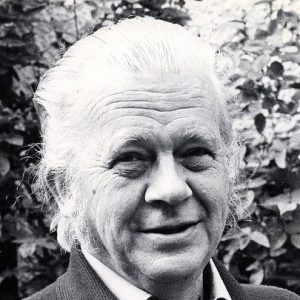


Ernst Friedrich Schumacher was a German-British statistician and economist, known for his proposals for human-scale, decentralized and appropriate technologies. He served as Chief Economic Advisor to the British National Coal Board and founded the Intermediate Technology Development Group. His influential work, 'Small Is Beautiful', was published in 1973.
Any intelligent fool can make things bigger, more complex, and more violent. It takes a touch of genius – and a lot of courage to move in the opposite direction.
We must do what we conceive to be the right thing, and not bother our heads or burden our souls with whether we are going to be successful. Because if we don’t do the right thing, we’ll be doing the wrong thing, and we will just be part of the disease, and not a part of the cure.
Modern man talks of a battle with nature, forgetting that, if he won the battle, he would find himself on the losing side.
Development does not start with goods; it starts with people and their education, organization, and discipline. Without these three, all resources remain latent, untapped, potential.
Anyone who thinks consumption can expand forever on a finite planet is either insane or an economist.
Work and leisure are complementary parts of the same living process and cannot be separated without destroying the joy of work and the bliss of leisure.
Wisdom demands a new orientation of science and technology toward the organic, the gentle, the elegant and beautiful.
The real problems of our planet are not economic or technical, they are philosophical. The philosophy of unbridled materialism is being challenged by events.
Our task – and the task of all education – is to understand the present world, the world in which we live and make our choices.
You can either read something many times in order to be assured that you got it all, or else you can define your purpose and use techniques which will assure that you have met it and gotten what you need.
The printing press is either the greatest blessing or the greatest curse of modern times, sometimes one forgets which it is.
Any intelligent fool can invent further complications, but it takes a genius to retain, or recapture, simplicity.
Perhaps we cannot raise the winds. But each of us can put up the sail, so that when the wind comes we can catch it.
Our intentions tend to be much more real to us than our actions, and this can lead to a great deal of misunderstanding with other people, to whom our actions tend to be much more real than our intentions.
I’m not at all contemptuous of comforts, but they have their place and it is not first.
Anything that we can destroy but are unable to make is, in a sense sacred, and all our ‘explanations’ of it do not really explain anything.
The best aid to give is intellectual aid, a gift of useful knowledge. A gift of knowledge is infinitely preferable to a gift of material things.
Eagles come in all shapes and sizes, but you will recognize them chiefly by their attitudes.
The modern world tends to be skeptical about everything that makes demands on man’s higher faculties. But it is not at all skeptical about skepticism, which demands hardly anything.
I have no doubt that it is possible to give a new direction to technological development, a direction that shall lead it back to the real needs of man, and that also means: to the actual size of man. Man is small, and, therefore, small is beautiful.
The richer a society, the more impossible it becomes to do worthwhile things without immediate pay-off.
Every increase of needs tends to increase one’s independence on outside forces over which one cannont have control and therefore increases existential fear.
True art is the intermediary between man’s ordinary nature and his higher potentialities.
We think work with the brain is more worthy than work with the hands. Nobody who thinks with his hands could ever fall for this.
It is doubly chimerical to build peace on economic foundations which, in turn, rest on the systematic cultivation of greed and envy, the very forces which drive men into conflict.
If I limit myself to knowledge that I consider true beyond doubt, I minimize the risk of error but I maximize, at the same time, the risk of missing out on what may be the subtlest, most important and most rewarding things in life.
Why precisely do we want to change land ownership? The answer seems to me to be quite clear: to inhibit land speculation, to inhibit the private exploitation of the scarcity-value of land, to inhibit as we might say the cornering of land.